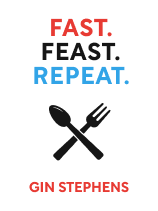

This article is an excerpt from the Shortform book guide to "Fast. Feast. Repeat." by Gin Stephens. Shortform has the world's best summaries and analyses of books you should be reading.
Like this article? Sign up for a free trial here .
Is it normal for weight loss to plateau when intermittent fasting (IF)? How can you overcome a weight loss plateau on an IF diet?
A weight-loss plateau can be tricky to get around. According to Gin Stephens, the author of Fast. Feast. Repeat., there are two ways to transcend the weight loss plateau by intermittent fasting (IF): you can either adjust your fasting or adjust your feasting.
Here’s how to transcend the intermittent fasting plateau, according to Gin Stephens.
Gin Stephens: Overcome Plateaus by Adjusting
As you lose weight, your body might settle into a new set point—a default weight that your body wants to maintain—and resist further weight loss. According to Stephens, the best solution to the intermittent fasting plateau is to either adjust your fasting or your feasting.
- Adjust your fasting. First, make sure you’re fasting cleanly. Second, switch up your fasting rhythms: Try going from TRE to ADF, changing the length of your fasting window, or adjusting when you fast and when you feast.
- Adjust your feasting. Recognize if you’re overeating or eating too many ultra-processed foods, and try delaying these foods for a month or two. In addition, try switching up your eating style by getting more whole foods or adjusting your macronutrient intake.
Maintain Your Weight
Once you’ve approached your goal weight, Stephens recommends choosing a “goal body” to maintain. Your weight will naturally fluctuate a bit, so stressing about maintaining an exact number isn’t helpful. Instead, trust that your body will reach a healthy weight and stay there.
To maintain your goal body, keep up with good IF habits. If you gain weight, check your eating habits and adjust them a bit to settle back down. If you lose too much, eat a bit more. It’s okay to enjoy a bit more food from time to time, and it’s okay to eat less when you need to.
You can also use your “goal” clothing to keep perspective. If you still fit in your goal pants, you’re doing fine. If you feel a little tight in them, that’s a gentle signal to ease back a bit on the feasting.
| Celebrate Your New Set Point In The Obesity Code, Jason Fung explains that, contrary to popular understanding, obesity isn’t caused by overeating. Instead, overeating is a symptom of obesity. In Fung’s view, the term obesity doesn’t refer to being overweight—rather, it refers to a hormonal imbalance with side effects including persistent hunger and intractable weight gain. It also drives up your set point, the body’s preferred default weight. This imbalance is likely caused by ultra-processed foods. Fung explains that your set point is like the setting on a thermostat: It’s the balance-point your weight naturally works to maintain, and it returns there if you gain or lose too much weight. Your body maintains its set point via a complex balance of hormones such as insulin, leptin, and cortisol. Obesity throws this balance off, but when you fast regularly, you give your body daily time to heal hormonal imbalances—such as the insulin resistance that corresponds to obesity—and lower the setting on your body’s “thermostat.” As Stephens implies above, reaching a new set point is worth celebrating. Further, you can relax about weight loss: Your body will naturally maintain its set point, and you now have the tools and knowledge to adjust and enjoy the lifestyle you want. |

———End of Preview———
Like what you just read? Read the rest of the world's best book summary and analysis of Gin Stephens's "Fast. Feast. Repeat." at Shortform .
Here's what you'll find in our full Fast. Feast. Repeat. summary :
- How intermittent fasting can help you lose weight, feel better, fight disease, and live longer
- An explanation of the cutting-edge science that supports fasting
- How to follow a four-week quickstart program to adapt to this new lifestyle






